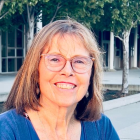Thank you for helping us meet our fundraising goal!
These in-their-own-words pieces are told to Patricia Lane and co-edited with input from the interviewee for the purpose of brevity.
Ankur Patel, a 21-year-old nursing student from Terrace, British Columbia, is helping nurses see care for the planet as care for people.
Tell us about your projects.
I am on the board of the Canadian Nursing Students' Association. In January 2025, we will ask our members to endorse a position paper and resolution I helped draft, calling on the Canadian Association of Schools of Nursing ( CASN) to further incorporate awareness of the impacts of the climate crisis into the nursing school curriculum. The Canadian Association of Nurses for the Environment has recently signed, and it is important to demonstrate student support.
Nurses need this education to provide the best care. A nurse is often the first point of contact for routine, emergency and preventative care. Nurses who understand the toxicity of wildfire smoke can help people better evaluate their risks of going outside on smoky days. If nurses know wildfires will increase, they will be motivated to have information about subsidies for clean air filtration systems. We need to know that ticks and other insects are migrating north to more readily identify Lyme disease and potentially fatal spider bites. Nurses understand the impact of extreme heat on our bodies. If they also know more unnaturally hot days are coming, they can advocate for cooling centres and encourage their use. A nurse who is aware of flood risk can help those requiring regular access to healthcare to prepare. If nurses are sensitive to the impacts of climate in the Global South, they may be more helpful when a patient with ties to that area presents with mental distress.
When I graduate, I will join a respected profession which enjoys high confidence in the minds and hearts of people. Nurses, who understand the enormity of the public health impacts of global warming, will be more likely to join the growing chorus demanding we stop burning oil, gas and coal and support a clean economy. Our voices matter.
I am helping my nursing school to make a stronger contribution to the University of Northern British Columbia’s (UNBC) proud reputation as “Canada’s Green University.” The Planetary Health Report Card is an international student movement to evaluate and improve planetary health content in health professional schools. With the full support of the nursing faculty and Amy Klepetar, a member of UNBC’s nursing faculty, we are assessing curricula, buildings and other metrics to help decision-makers identify areas for improvement.
I attend meetings as a student voice of a committee of nurse educators who are all committed to greening nursing education. They are very open to ideas about how to encourage reuse of training materials, like tubing and syringes, on mannequins.
I am also helping the Youth Climate Corps of British Columbia to work with the BC Federation of Labour and unions of health professionals to allow young people to see healthcare jobs as green careers.
What makes your work hard?
The enormity of the crisis, the slow response and the reality that healthcare is an oversized contributor. Juggling all that I do can feel like a lot, but it is often hard to feel that it is enough. Drafting resolutions, building partnerships and pressing for curriculum change are all vital, but they take longer than the time we have. But even as a student nurse, every day is a good day. If I can help one patient access earlier and better healthcare, I have empowered them, improved their health and reduced the load on the health system, freeing up resources to allow people to think at a systemic level. Knowing my work is kind and just at both individual and systemic levels makes me hopeful.

How did you come to be so involved?
When I was a small child, we lived very close to a major highway in Toronto. I almost died from severe asthma. But when we moved to Kitimat, British Columbia, it almost completely disappeared. When I go back to Toronto, I have to limit my exercise or I have trouble breathing. My body knows it depends on a clean environment to survive. When I chose to study nursing, I wanted to give both care for the immediate concern and to help prevent it from reoccurring.
The projects with which I am engaged have actually found me. I wanted to be involved, so I began attending conferences and webinars. People drew me in, and I said, “Yes.”
What do you see if we get this right?
Nursing is care for humans and the planet on which we depend.
What would you like to say to other young people?
You don’t need to have answers or even all the questions. Just show up. Passionate people want others to join them. Even if all you have is a few minutes, there is room for you. We need everyone.
What about older readers?
Thank you. Your work allows us to be here.
Give the youth in your life space to listen and learn. They might help solve your problems, and if nothing else, it's always better to have company.







Comments
Bravo. Mr. Patel displays a great attitude generating useful ideas for addressing the most critical long-term issue of our civilization.